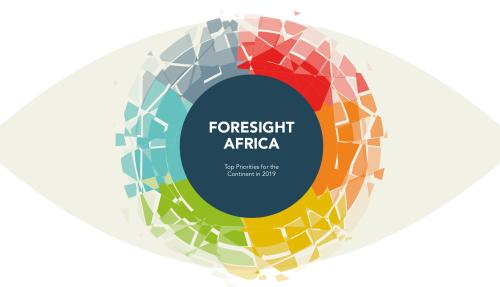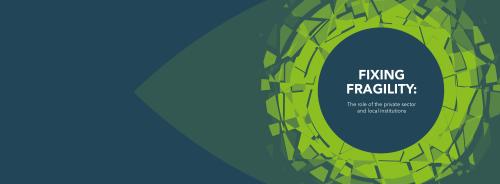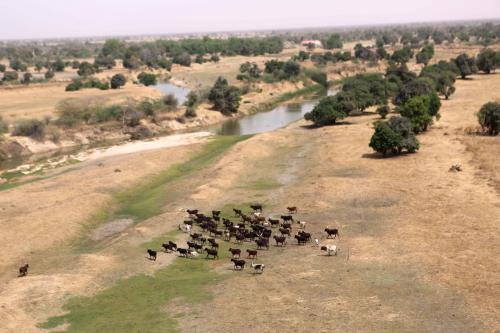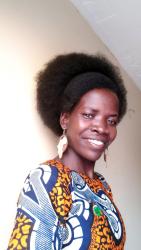Below is a viewpoint from Chapter 4 of the Foresight Africa 2019 report, which explores six overarching themes on the triumphs of the past years as well as strategies to tackle the remaining obstacles for Africa. Read the full chapter on fixing fragility.
The first time I opened my eyes, I was in a refugee camp. I thought the camp was my country, only to learn later that it was not. I was told that South Sudan is my home, a country swallowed by an aimless civil war and severe famine. Then, like any refugee, I hoped of one day seeing my homeland, however dangerous it may be.
It was the hardships I endured at the camp that inspired me to help girls and women in South Sudan. Out of the 30 girls that I started pre-primary education with in the camp, only three of us made it to university. Many of the girls faced insurmountable challenges like early childhood marriages—often a source of family income—and lack of parental support toward their education because of the financial restrictions of poverty. It was heartbreaking to watch my classmates encounter such devastating roadblocks.
On my own journey, I found strength in the words of Nelson Mandela: “Everyone can rise above their circumstances and achieve success if they are dedicated to and passionate about what they do.” My education from Uganda Christian University in the field of economics was obtained through my hard work and determination to defy all the odds in the refugee camp. The support from my parents and the access to a few limited resources and services enabled me to go to university and become one of the few educated and empowered young girls from the camp.
My experience in the refugee camp gave me the strength to endure the challenges and the desire to help others.
On January 9, 2005, the civil war in South Sudan ended and we headed back home. Upon arrival, the home we had been looking forward to seeing was not much of a house. Everything was in ruins; we had to start rebuilding our lives. To our dismay, after a few years of rebuilding another war broke out—but this time we stayed.
People have often asked me what it means to live in South Sudan, a country that has been drastically affected by violent conflicts, a so-called fragile state. Imagine feeling that you can die at any time. Imagine being surrounded by guns, bitterness and agony, massive loss of lives and property, poor health care and education, inaccessible infrastructure, systematic violations of human rights, and severe famine. I would not wish it on anyone. But my experience in the refugee camp gave me the strength to endure the challenges and the desire to help others.
Having spent my entire life as a refugee in a foreign country, and after seeing the abuse that young girls face in fragile states, I decided to develop an initiative to empower and give hope to young girls in South Sudan. In November 2017, I created the Nasvick Initiative, with the primary objective to promote women’s soccer in South Sudan. The initiative uses women’s sports as a platform to promote peace and reconciliation during this recovery period, with the theme “shoot to score, not to kill.” We currently work with 924 girls, and the turnout for games per team has increased from 22 girls to more than 30 across the country. We now have 42 teams and are expanding to engage more girls.
There is still a need for the government and policymakers to promote local youth initiatives and interventions that focus on peacebuilding.
Though there are initiatives like mine to improve life in fragile states, there is still a need for the government and policymakers to promote local youth initiatives and interventions that focus on peacebuilding as we strive toward rebuilding South Sudan. Civil society should speak for the voiceless, like the young girls I knew in the refugee camp. Surrounding countries and the African Union should treat refugees and foreigners as fellow Africans with love and the spirit of “Ubuntu,” meaning humanity toward others. Countries must also stop funding and fueling conflicts in neighboring countries.
I feel fortunate to have been a recipient of the 2018 Young African Leadership Initiative Fellowship, which allowed me to travel and study in the United States and to meet many other talented young Africans. The European Union and United States should channel their financial aid and support to similar education and human capital development programs, like the Mandela Washington Fellowship, whose impact can be felt through their activities, rather than sending grants or giving loans that end up in the pockets of a few corrupt officials. It may also be useful to use other implementing partners to run their programs in the country, rather than the government, where it is hard to hold individuals accountable.
Through all of this, we must give hope to those who have been marginalized so that they too can “rise above their circumstances and achieve success.”
The Brookings Institution is committed to quality, independence, and impact.
We are supported by a diverse array of funders. In line with our values and policies, each Brookings publication represents the sole views of its author(s).










Commentary
Life in fragile states: A young girl’s journey
March 19, 2019